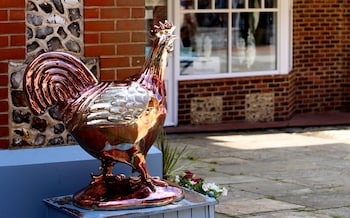Susan Holmes is 76 but she does not feel it. “When you get to this sort of age, you can’t actually think that you are 76. I have worked all my life, I run two businesses, I don’t think of it like that.”
But Holmes and her husband, who is 78, have suddenly been forced to face the brutal realities of ageing.
More than a year ago, her husband got a blister on his toe. Problems with his blood flow meant it never healed and four weeks ago his leg was amputated below the knee.
The couple have been forced to make big adjustments as a result. While he recovers in hospital, Holmes is managing the sale of their five-bedroom, £1.2m home near Dorking, Surrey, and arranging a move to an £830,000 bungalow that will be wheelchair accessible.
This will release £370,000 in cash, meaning that Holmes and her husband are starting to think about another stark reality: inheritance tax.
Holmes and her husband live in what is effectively inheritance tax ground zero.
The former constituency of Mole Valley in Surrey – the bulk of which now sits in the new constituency boundary of Liberal Democrat-voting Dorking and Horley – is the inheritance tax capital of Britain.
In the 2020-21 tax year, there were 139.6 estates liable for inheritance tax for every 100,000 residents, according to the Institute for Fiscal Studies (IFS). This was the largest total in proportion to the local population of any parliamentary constituency in the UK.
There will soon be more Mole Valleys. As Britain gets older, and older people get richer, inheritance tax is no longer the domain of only the super rich. As it becomes more mainstream, it will become an increasingly important revenue stream for the Treasury.
But for now, it is here that a potential Labour inheritance tax raid would hit hardest.
Rachel Reeves used her first speech as Chancellor to warn that the new Labour government has inherited public finances that are in their worst state since the Second World War. The new Government is under growing pressure to find new sources of cash to fund struggling public services and Reeves’ commitment to get debt falling means borrowing is likely off the table.
Last month, the Guardian reported that the Labour Party was drawing up plans for increases in inheritance tax and capital gains tax that could together raise an extra £10bn for the public purse. On the campaign trail, Labour ruled out tax rises on almost all other taxes – but not these.
A Treasury spokesman said the Government will “keep taxes, inflation and mortgages as low as possible”.
For many people thinking about inheritance tax planning, the bills are already eye-watering.

Holmes and her husband’s total estate will be liable for an inheritance bill of hundreds of thousands of pounds when they die.
Should they make lifetime gifts (which will be tax-free as long as they survive for another seven years) to their two daughters now? Or should they keep their money so that they can keep travelling, or in case they need to cover care home bills, which cost £7,000 per month locally?
“I’ve been working since I was 15 and when I had my children, both of them, I went back to work straight away. I have really fought for that money. I’ve worked ‘til 10pm at night and from 5am in the morning. I have always worked so hard. I don’t want to pay inheritance tax. It’s wicked,” says Holmes.
In Mole Valley, the large number of inheritance tax-liable estates reflects a combination of two factors – the number of IHT-liable estates reflects not just how many local people are rich, but that many of them are old. “It’s definitely retirement-ville,” says a local pensioner.
Inheritance tax is heavily concentrated in the South of England. Of the 50 constituencies with the largest proportion of IHT-liable estates, just two were outside the South of England, IFS data shows. Of the top 100, 38 were in the South East while 26 were in London.
Inheritance tax bills will also rise the most in the South over the coming years, as house prices continue to climb and older homeowners die.
By 2032-33, the Treasury’s annual tax take from inheritance tax will have more than doubled from £7bn today to £15bn a year (in today’s prices), according to the IFS. This will be a rise from 0.3pc of the UK economy to 0.5pc.
This is because the proportion of deaths resulting in inheritance will swell from 4pc to 7pc. Including people who will also have inheritance tax due on a spouse or civil partner’s death, the proportion of people affected by inheritance tax will be even higher, at 12pc, or one in eight people.
In London, the figure will be double this at 23pc – nearly one in four.
At the heart of Britain’s rising inheritance tax bill is the property market. “There has been so much wealth creation and wealth generation over the last 20 or 30 years in property,” says Richard Winter, a Surrey buying agent.
“People I was buying houses for when they were in their 40s and 50s are now in their 70s and 80s.”
Inheritance tax is typically charged at 40pc on the value of an estate above £325,000. If a person is passing on their home to their children, they also qualify for a £175,000 nil-rate band on the value of the property. This means that a person can have a total nil-rate inheritance tax allowance of £500,000.
But massive growth in property prices in recent decades mean that retirees’ assets, particularly in the South of England, often surpass this threshold.
The average home in Dorking costs £616,203, according to Rightmove. This means that even a person who has no assets except a typical local property which they own outright (which is the norm amongst over-65s) would face an inheritance tax charge of £46,481 on their estate when they die.
But what is happening in the South could be a blueprint for the rest of the country as property prices continue to rise, warns Chris Etherington, a partner at the accountant RSM.
A freeze on the nil-rate thresholds, which was extended by chancellor Jeremy Hunt until April 2028, means more people are also getting pulled into paying inheritance tax by so-called fiscal drag, whereby estates swell with inflation, but the thresholds do not.
Dorking on first impression appears unfazed by its crown as an inheritance tax capital.
It is a quirky market town. Someone has crocheted strings of flowers that are entwined across the railings around St Martin’s Square in the town centre. On the roundabout at the bottom of the high street is a giant steel statue of a five-toed cockerel. The Dorking chicken was a prize bird, formerly a favourite of Queen Victoria, which has become the symbol of the town.
“He’s normally kitted out by the guerrilla knitters of the town, who usually do something topical. They just sneak out in the night and we never know what he is going to be wearing,” says Kathy Atherton, chairman of the Dorking Museum.

During the 2012 Olympics, when the cycle races were passing through the town, the chicken was given knitted sideburns to look like Bradley Wiggins.
But it is not difficult to find people who are anticipating big inheritance bills on their estates – and are unhappy about it.
“It’s double taxation, it is just unfair,” says Gary, 67, a former managing director of a company in the construction sector.
He himself inherited £25,000 from his father in his late 30s, helping him move up the property ladder to a larger home. The estate he will leave behind himself will be 88 times as large, at around £2.2m, including his home.
Gary’s financial situation is part of a national trend. For those who do inherit, the windfalls are ballooning in proportion to earnings.
Amongst people with the wealthiest fifth of parents, those born in the 1960s received inheritances worth 17pc of lifetime income, according to the IFS. For those born in the 1980s, the average inheritance was nearly double this at 30pc of lifetime income.
But inheritance has a demographic problem. In theory, it is an intergenerational transfer of wealth. But ultimately this often does not reach the young – it is a transfer from the oldest generation to the second oldest.
“If inheritance is coming from your parents, then for most people they are going to be receiving it in their 50s and 60s. That is money coming late in your career,” says David Sturrock, senior research economist at the Institute for Fiscal Studies.
People born in the 1950s inherited at 58, but people born in the 1980s inherit at 64, according to the IFS. Over the same period, the proportion inheriting in their 70s has increased from 19pc to 30pc.
It is a tax that is ripe for reform. But the bottom line is a question of principle, says Sturrock.
“It’s whether you think it’s the right thing for the Government to try and reduce inequalities between people who inherit more and who inherit less, or whether you think you know it’s kind of your right to do what you want with the money you accumulate once you’ve paid income tax on it,” Sturrock says.
How would Holmes feel if Labour increased inheritance tax? “I would be incensed,” she says.
Across the leafy South of England, many more are likely to share the sentiment.
Disclaimer: The copyright of this article belongs to the original author. Reposting this article is solely for the purpose of information dissemination and does not constitute any investment advice. If there is any infringement, please contact us immediately. We will make corrections or deletions as necessary. Thank you.



